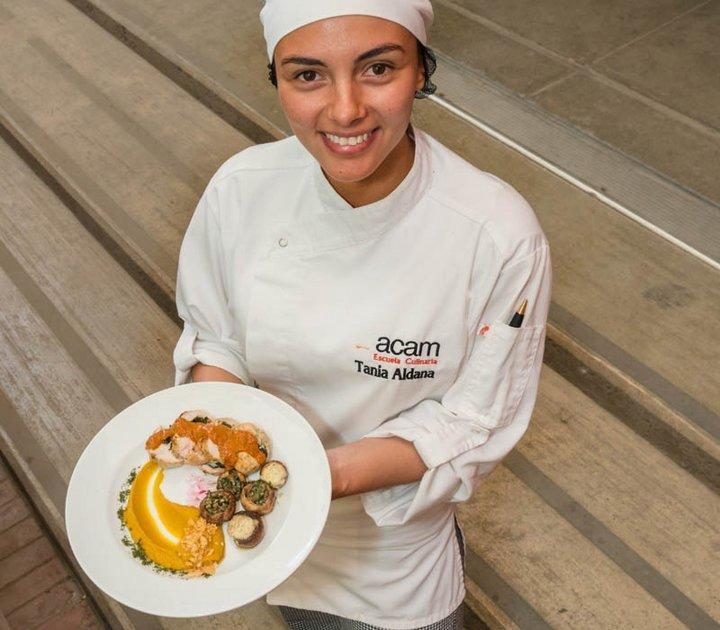Blog Uniting efforts to enhance the use of neglected Mayan superfood chaya

Rose Robitaille, Research Fellow, Healthy diets from sustainable food systems, discusses the potential of chaya, an underutilized Mayan spinach, and reports on the Chaya Conference held this March in Guatemala City.
It’s 8:30 on Tuesday morning, 13 March 2018, on the verdant campus of the Universidad del Valle de Guatemala in Guatemala City. It seems to be business as usual on the university grounds with students slowly filing onto campus and birds chattering in the palms overhead, yet another more unlikely gathering is underway bringing together stakeholders to discuss a native and little-known plant, chaya.
Chaya (Cnidoscolus aconitifolius) or Mayan spinach is an evergreen shrub that has been domesticated for food and medicine in Mesoamerica since pre-Columbian times. In addition to its cultural relevance, chaya is an important source of nutrition and is considered to be a superfood. Despite these attributes, chaya has received very little research attention to promote its use in Guatemala to meet national challenges of poverty and malnutrition.
To contribute to filling this gap, Nadezda Amaya, Gender and Value Chain Specialist, Bioversity International, assessed the current use and value chain of this crop to identify a strategic holistic approach for value chain enhancement. Amaya’s research revealed the potential benefits and opportunities for enhancing the chaya value chain, especially for the health and livelihoods of rural indigenous women. She found that while chaya is well known and used by villagers in Guatemala and has a strong market in the Yucatan in Mexico, it is currently hard to find in markets in Guatemala.
Guided by coordinated, pro-poor and gender-sensitive approaches, conference attendees explored ways to strengthen the chaya value chain. Participants from all walks of life were present, including representatives from the government, national and international NGOs, academia, gastronomy, private enterprises and local producers. Lively presentations covered current research initiatives on best production practices, use of chaya in school gardens, nutrition analyses and cooking preparations, market and value chain analyses, analysis of national programmes that are conducive to enhancing the use of underutilized species, and marketing strategies for chaya.
The enthusiastic dialogue on the promotion of chaya continued outside of the conference hall with culinary delights prepared for coffee and lunch breaks by Guatemalan chef, Paula Enriquez and her team of students from the La Academia Culinaria de las Américas. These talented chefs integrated chaya into all dishes, which were made with several local ingredients. Recipes, both sweet and savory, helped to highlight the great versatility of chaya and demonstrate the gastronomic and nutritious potential of this underutilized vegetable. The engagement of young chefs in training was an important (and delicious) result of the conference for promoting greater use of chaya in Guatemalan cuisine.
Overall, the chaya conference and stakeholder meeting set the agenda for collaboration in 2018. Many complementary initiatives and goals were sighted among the participants, and a strong desire to harness these uncoordinated efforts emerged. Moving forward, key stakeholders have not only been identified but also engaged, forming a foundation to create a network for the promotion of chaya. The event was widely covered by the media in Mesoamerica, which has contributed to raising awareness for the unique values of chaya.
This conference and the chaya value chain study were completed as part of the International Fund for Agricultural Development (IFAD) and European Commission (EC) funded project ‘Linking agrobiodiversity value chains, climate adaptation and nutrition: Empowering the poor to manage risk’. The conference ‘Chaya en Guatemala: consulta participativa sobre necesidades, desafios y opportunidades’, was held at the Universidad del Valle de Guatemala, partner in the project since 2016. Proceedings for the conference are currently under preparation. Learn more by clicking on the individual presentations below.
- La chaya una planta muy nutritiva. Video by UVG and USDA
- La Chaya (Cnidoscolus aconitifolius): contribuciones al conocimiento y aprovechamiento de esta planta nutritiva. Dr Rolando Cifuentes (Centro de Estudios Agrícolas y Alimentarios Universidad del Valle de Guatemala)
- Valor nutricional y functional de hojas de uso ancestral de la culinaria mesoamericana. José Alfredo López (Universidad San Carlos de Guatemala and Eurotropic, S.A.)
- Estrategia Nacional para la Prevención de la Desnutrición Crónica 2016-2020. Sergio Ruano (Ministerio de Agricultura, Ganadería y Alimentación – MAGA)
- Trabajos de Investigación Sobre Cultivos Subutilizados y Experiencias con Chaya (EEUU). Cecilia Gonzalez (Educational Concerns for Haiti Organization - ECHO)
- Análisis de la cadena de valor y potencial de mercado de la chaya para fortalecer la resiliencia climática, seguridad nutricional e ingresos en Guatemala. Nadezda Amaya (Bioversity International)
- Experiencias y lecciones aprendidas en la promoción de la Chaya en Guatemala. Penny Rambacher and Andrea Guzman, R.D. (Miracles in Action)
- Promoviendo la Chaya a través de Tortillas Verdes. Andrea Guzman (Maya Health Alliance)
- Aldea Maya: Educación – Sostenibilidad – Nutrición. Jaime Marroquin (Aldea Maya)
- Agroindustria del cultivo y procesamiento de Chaya, Amaranto y Chia en Guatemala. José Alfredo López (Eurotropic, S.A.)
- Aprovechando los valores nutricionales de la chaya a través de la extracción de proteína. Javier Rodriguez (Brigada de Educación para el Desarrollo Rural No. 73 Acancéh, Yucatán)
- Hamburguesa guatemalteca. Chef Paula Enríquez Winter (Kreadi, Coban, GT).
This work in Guatemala is part of the CGIAR Research Program on Climate Change, Agriculture and Food Security (CCAFS) and the CGIAR Research Program on Agriculture for Nutrition and Health (A4NH), and is supported by CGIAR Fund Donors.
